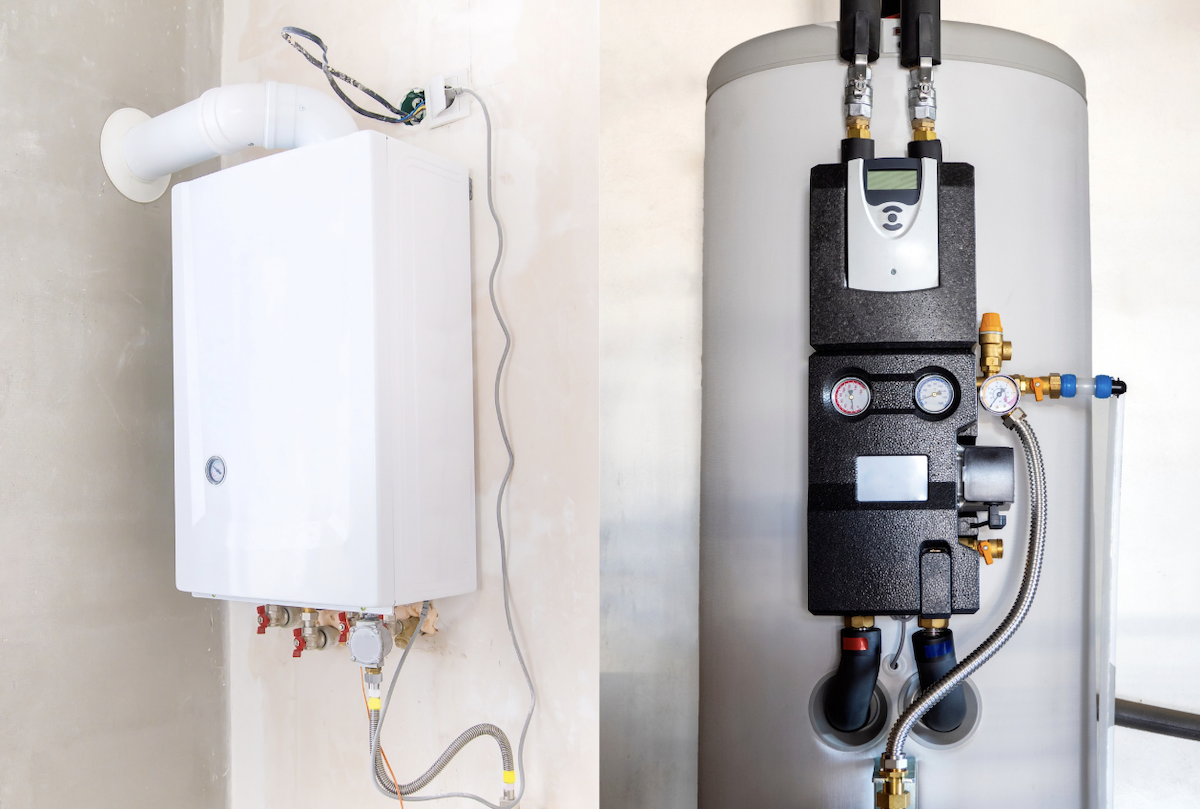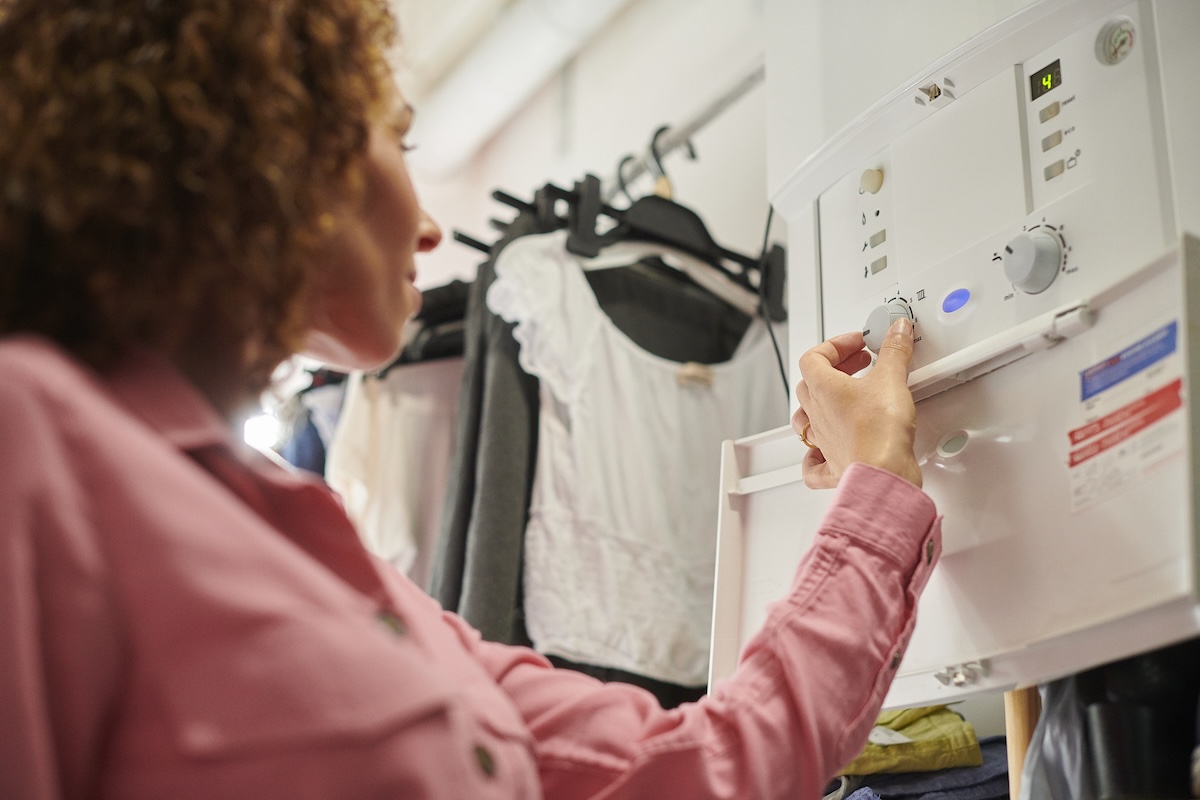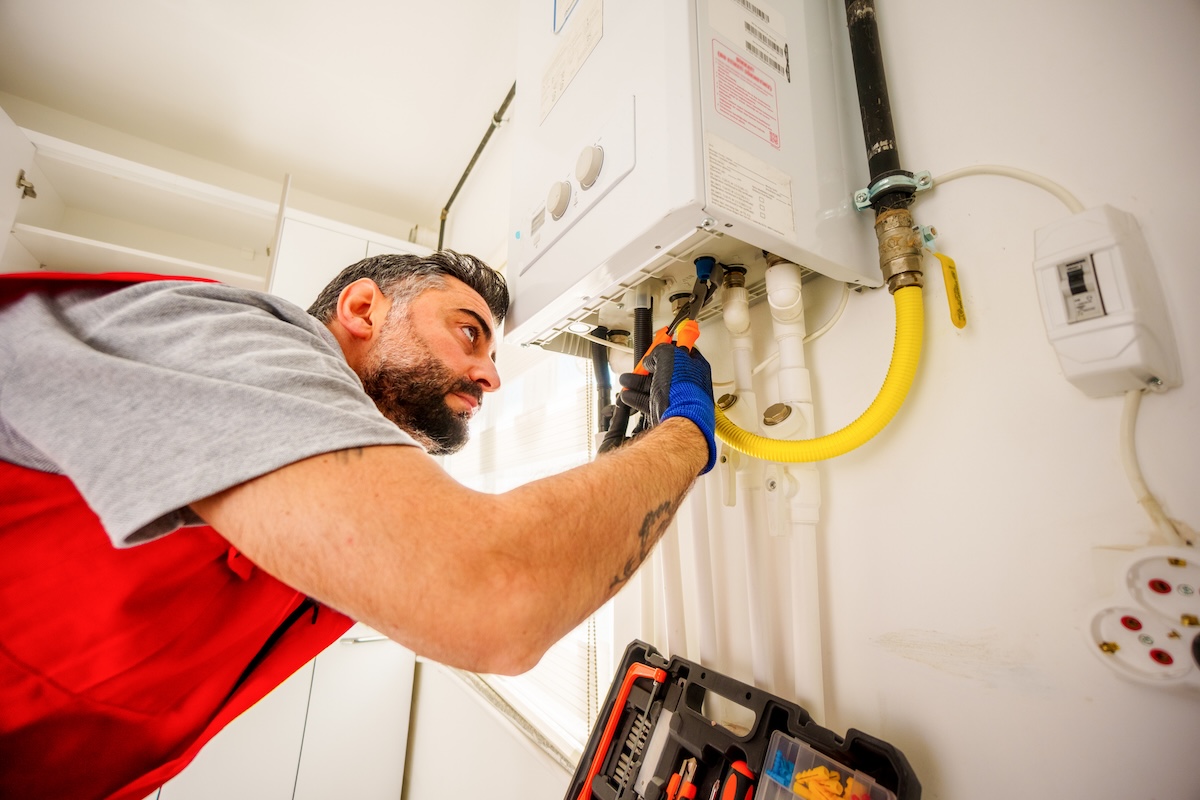

We may earn revenue from the products available on this page and participate in affiliate programs. Learn More ›
The overlap of boiler and hot water heater functionality in a home often leads to these two appliances being confused for one another. While steam or hot water boilers can be used to heat water for use throughout the home, they’re more commonly used to heat your indoor air with a series of connected radiators.
Hot water heaters, meanwhile, are exclusively designed to heat water for use in your faucets, fixtures, and water-using appliances. Your water heater will warm incoming cold water before distributing that hot water throughout the house. Identifying the differences between a boiler vs. water heater is essential for your ongoing home maintenance, so use this guide to learn more about these key appliances in your house.
What is a boiler?

If you have just moved into a house with a boiler, you may be asking whether a boiler the same as a water heater, and if not, then what exactly is a boiler? Asking this question is your first step in understanding your home heating system, which will make future maintenance and repairs far easier to tackle.
“A boiler is a system that uses different sources of fuel to heat water and make steam or hot water. That steam or hot water moves through pipes and radiators to heat your home,” explains Robert Mazzacone, president and master plumber at Mazzacone Plumbing & Heating. Conventional boilers have a hot water storage tank that is connected to a closed system of pipes. The hot water is circulated through these pipes to the radiators throughout your house, where the heat is released into the air to warm the space.
There are also combination boilers, which can make the “is a boiler a water heater?” question a bit more convoluted, since combination boilers are all-in-one units that heat water for home heating and for use at hot water faucets. These units are a great option if you have a smaller space because they do the job of a boiler and a water heater.
What is a water heater?

Your water heater is distinct in both appearance and primary function when compared to a boiler. “A water heater gives you hot water for everyday things like showers, dishes, and laundry, explains Mazzacone. “It can be a tank that stores hot water or a tankless type that heats water on demand when needed.”
Tank-style water heaters have an insulated tank where incoming cold water is collected, heated, stored, and then distributed throughout your home, while a tankless water heater is significantly smaller and is designed to heat the incoming cold water as it passes through the water heater, providing the home with water on demand.
Typically, a water heater uses natural gas or electricity as a fuel source to heat the water, though some direct-fired models may use heating oil as fuel. The monthly cost to operate a gas vs. electric water heater varies, so it’s worth researching the benefits and drawbacks of each if you are purchasing a new water heater for the home.
| Boiler | Water Heater | Combination Boiler | |
| Circulates water | x | x | |
| Water safe for consumption | x | x | |
| Heats water | x | x | x |
| Heats other spaces in home | x | x | |
| Stores water | x | x | |
| Temperatures beyond 140°F | x |
Similarities Between Boilers and Water Heaters

While there are many differences between a hot water boiler vs. a water heater, there are also notable similarities that are often the cause of confusion between these two appliances. Understanding both the differences and similarities between a boiler and water heater will help you to maintain these systems and identify the source of hot water problems within your house.
- Both are designed to heat water
- Both use a pressurized storage tank to store water
- Both systems can be powered by electricity, natural gas, or heating oil
- Both distribute hot water throughout the home via pipes
- Both are installed and maintained by plumbers
Differences Between Boilers and Water Heaters

The main difference between a boiler and water heater is its primary function, but there are other differences that you should be aware of so that you can accurately address issues with home heating and plumbing.
- Boilers circulate water through a closed system, while water heaters distribute hot water to faucets and water-using appliances
- Hot water from a water heater is generally safe for consumption, while the water from a boiler is not considered potable
- Boilers heat the rooms of the home, while water heaters only heat the water that will be used at showers, hot water faucets, and water-using appliances
- Water heaters typically never heat the water above 140°F, while boilers may heat water up to 200°F
- Boilers cost more to purchase and install than water heaters
- Water heaters have a shorter lifespan than boilers
Installation
The cost to install a boiler is generally higher than the installation price of a water heater because boilers are generally larger and have a more complex system. Depending on your current setup, you may need to budget for new electrical work, ductwork, or gas lines when you are installing a new boiler.
Water heaters are typically easier to install because they require fewer connections and components, though in some cases you may need to budget for new water lines or gas lines, depending on your current setup. Additionally, the cost of a tankless water heater is generally higher than the cost of a tank-style water heater.
- Boiler System Installation Cost: $3,604 to $8,446
- Water Heater Installation Cost: $882 to $1,809
Maintenance
In order to keep your home functioning properly, you need to stay on top of regular system maintenance. While your boiler and water heater both require annual maintenance to operate efficiently and effectively, they are maintained in different ways.
Boiler maintenance
- Homeowners should conduct a visual inspection by checking the exterior of the boiler for leaks or other problems
- Pros should lubricate the circulating pumps to reduce wear and tear
- Have a pro flush the boiler to remove built-up sediment and debris
- Homeowners should conduct a monthly safety valve check to ensure the security of the system
- Make repairs as needed by hiring a professional
Water heater maintenance

- Homeowners should conduct a visual inspection by checking the exterior of the water heater for leaks or other problems
- Homeowners can check the pressure relief valve to ensure it is working properly
- Experienced DIYers or professionals should drain and flush the water heater to remove sediment and debris
- Homeowners should regularly operate the valves to prevent them from seizing
- Hire a professional to make any necessary water heater repairs
Lifespan
Boilers typically outlast water heaters. A standard steam boiler system may last for 25 or more years, while a combination water heater/boiler lasts for about 10 to 15 years. On the other hand, a tank-style water heater will generally only last about 8 to 12 years before needing to be replaced. Though, if you have a tankless water heater, it may last as long as 15 to 20 years. So even though the cost to purchase and install a boiler system is higher than the cost of a water heater replacement, it’s important to keep in mind that you may replace the water heater twice before needing to buy a new boiler.
Efficiency
Trying to compare the efficiency of a water heater to the efficiency of a boiler is like comparing the efficiency of a dishwasher to the efficiency of a clothes washer. While both heat and distribute water, the main function of these appliances is different, making it hard to draw accurate conclusions regarding efficiency. As Mazzacone notes, “a boiler is efficient at heating a home, while a water heater is efficient at giving you hot water for daily use.”
Additionally, the efficiency of your water heater and boiler depend on the specific type of unit. For instance, tankless water heaters are generally more efficient than tank-style water heaters because they don’t store and reheat water. Your best bet in terms of efficiency, if you have a small home? Invest in a high-efficiency combination boiler that can be used for both hot water and home heating, rather than having two separate appliances to accomplish the same goals.
FAQ
No matter the product specs, even the best water heater does not turn into a boiler because these appliances are distinct and built for different jobs. However, if a water heater exceeds a storage capacity of 120 gallons, an operating pressure of 160 psi, an operating temperature of 210°F, or a heat input of 200,000 Btu/hr, then it may be classified as a boiler for the sake of regulatory and inspection requirements. Though, if your residential water heater exceeds any of these measurements, it’s recommended to have the unit serviced immediately to prevent any problems, such as the tank exploding.
The main disadvantage is the boiler prices, with a high upfront cost that may turn some homeowners off this type of system. Though, when it comes to functionality, boilers also tend to be slow to respond to thermostat changes, require greater space than a furnace system, and they are only for heating, so you will need a separate system for air conditioning. Additionally, the costs for boiler service, repairs, and replacement parts can be higher than they are for other HVAC systems.
Efficiency is generally measured between specific models of the same appliance, such as a heat pump water heater vs a tankless water heater, rather than between distinct and separate appliances. Mazzacone explains that boilers and water heaters “are efficient in different ways. They are designed for separate purposes, so you can’t really compare them directly.” However, for small homes you may be able to increase efficiency by investing in a combination boiler, which is essentially a boiler for hot water and home heating.
No, not every house has a boiler. In fact, most homes have a furnace they use for home heating. According to Mazzacone, “not every house needs a boiler. It depends on how the home was built and what system it uses. Older homes often have boilers, while many newer homes have forced air systems that give you both heating and cooling. A boiler can be great if the house is set up for it, but it is not the right choice for everyone.”
